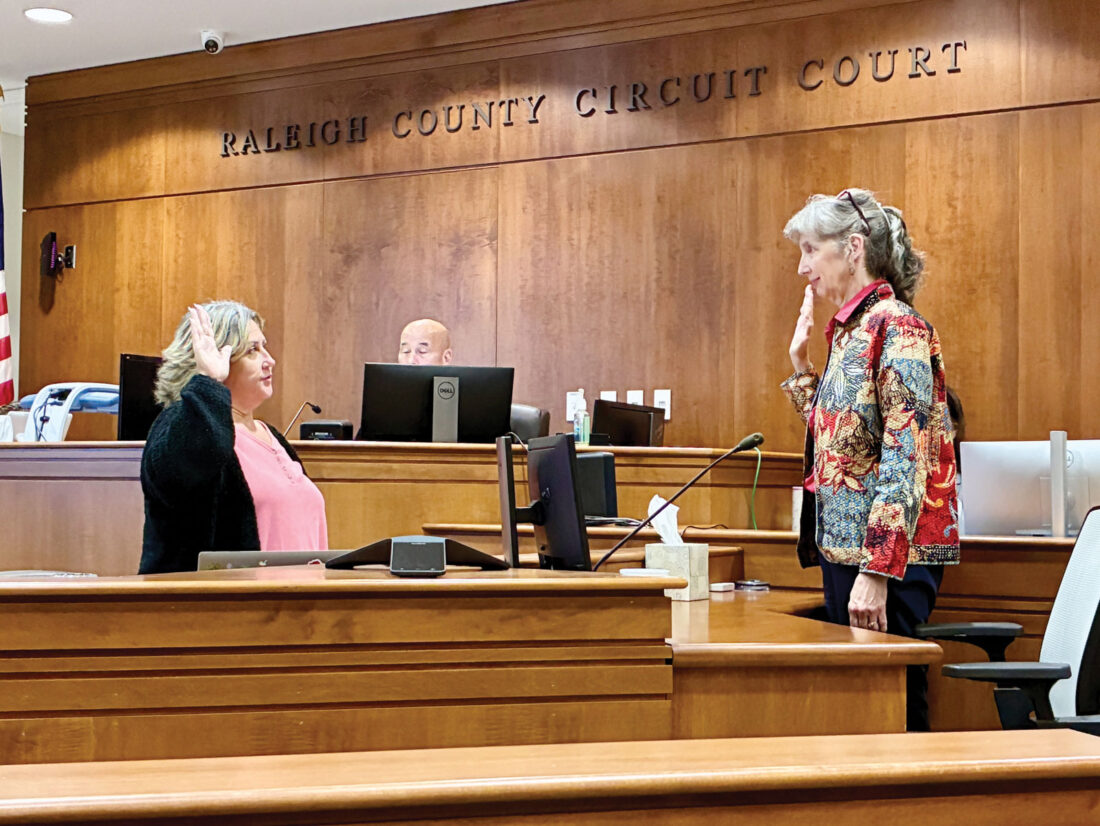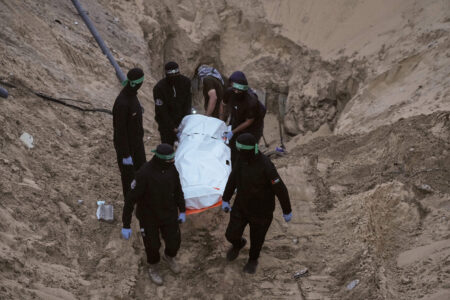Former West Virginia health officer testifies on day 2 of religious vaccine case

Pictured right, Dr. Cathy Slemp, a former state health officer and commissioner of the West Virginia Bureau of Public Health, is sworn prior to giving expert testimony on the importance of the state compulsory vaccine law for school-age children. (Photo by Steven Allen Adams)
BECKLEY — A ruling on a permanent injunction to block local and state education officials from rejecting religious vaccine exemptions to West Virginia’s compulsory vaccine law as mandated by Gov. Patrick Morrisey’s January executive order is likely still weeks away. Thursday marked the second day of a permanent injunction hearing in Raleigh County Circuit Court in downtown Beckley before 14th Judicial Circuit Judge Michael Froble. The judge took testimony Wednesday from experts presented by attorneys representing two parents seeking to stop school officials from not accepting religious vaccine exemptions granted for their children. Parties in the lawsuit heard testimony from experts provided by the West Virginia Board of Education, Raleigh County Board of Education, and intervenors on behalf of an unnamed Raleigh County teacher who is immunocompromised. Much of the focus Thursday morning was on the state Board of Education’s expert witness, Dr. Cathy Slemp. Slemp was appointed as the commissioner and public health officer for the formerly named Department of Health and Human Resources (now the Department of Human Services) in 2018, serving until June 2020 when she resigned under pressure from former governor (now-U.S. Senator) Jim Justice four months into the COVID-19 pandemic over disagreements over the tracking of active and recovered COVID-19 cases. Slemp had previously served as interim state health officer from 2002-11 before going into the private sector. She started her career at DHHR in 1994 as the clinical and program director, then transitioned to DHHR’s Division of Surveillance and Disease Control and later to the Center for Threat Preparedness, where she served nine years as director. During her testimony, Slemp said she stood by the state’s compulsory vaccine law (CVL) that requires children attending public and private school to show proof of immunization for diphtheria, pertussis, tetanus, polio, measles, mumps, rubella, varicella and hepatitis B unless proof of a medical exemption can be shown. “I do think that it meets the public health interest in maintaining healthy children and a healthy population,” Slemp said. “I think it does help to reduce disease and reduce outbreaks. And so, it does those goals well and it also helps us be wise stewards of public resources.” Slemp said all 50 states have similar compulsory vaccine laws, which has been on the books in West Virginia in one form or another since 1937. “At the end of the day, the compulsory vaccine law actually is about creating healthy communities,” Slemp said. “It’s about protecting the health and safety of children, having a well-vaccinated population so that we decrease disease spread and the occurrence of outbreaks.” The main reason childhood vaccines are important, Slemp said, was ensuring that as those children grow up into adults so that those adults maintain immunities to certain diseases and viruses with only boosters needed in some cases. Childhood vaccinations build up herd immunity in a community, helping to reduce the size and severity of outbreaks when they do occur. “We know that the vaccines over time have had really dramatic effects on disease and outbreaks historically,” Slemp said. “Children are the ones that are at highest risk of these diseases most commonly…Children come into the world not immune to all these diseases. And so, if we can vaccinate systematically across and get well-vaccinated, then we actually set up a well-vaccinated community, because those same kids grow up into adults.” For West Virginia’s medical vaccine exemptions, a health care provider does an evaluation of the child. The parent/guardian, via their physician, submits the medical exemption request. The Bureau for Public Health reviews those requests, with the majority of requests – 80% – being granted. The state health officer handles appeals of the 20% of medical exemption requests that are rejected. Slemp said there are approximately 50 medical exemptions granted each year. But since Gov. Patrick Morrisey’s executive order in January empowering the Department of Health to grant religious exemptions, there have already been 570 religious exemptions granted for the current 2025-26 school year. The two parents who filed suit in Raleigh County in June were granted a preliminary injunction in July prohibiting local and state education officials from rejecting the religious exemptions granted for their teenage children. Slemp said two non-immunized children in the public school system in Raleigh County would likely not be a risk given that the vast majority of their classmates would be immunized. But as more religious exemptions are granted for kindergarten children each year going forward, herd immunity would continue to be reduced year upon year. According to a report put together by Slemp, non-medical vaccine exemption rates have exploded across the nation since the COVID pandemic. States with both religious and philosophical exemptions saw their requests double and triple, exceeding the U.S. rate. Slemp said both Ohio and Pennsylvania have rates that can impact disease and decrease vaccination coverage rates. “I think that’s important to remember is that this is one year, and so this is just the entering kindergarteners right now,” Slemp said. “Then they become first graders, and you add another group the next year, and you add another group the third year until they’re in 12th grade. “Each year, with nominal exemptions, you are adding more and more people into the school system with lower vaccination coverage rates,” Slemp said. “And schools don’t stop at their walls. You’re doing the exact same thing in the community…If you look at this over 30 years, you are creating a population that is less vaccinated, and you have more significant risk.” The case wrapped up Thursday afternoon, with parties returning on Wednesday, Oct. 8, and Thursday, Oct. 9. Froble is also considering a consolidated case originally filed in Kanawha County by parents of immunocompromised children seeking to prohibit the Department of Health from granting religious exemptions. As the permanent injunction case continues on, the state Board of Education appealed the earlier preliminary injunction decision to the West Virginia Supreme Court of Appeals, which set a scheduling order for that appeal with oral arguments possible after Feb. 16, 2026.





